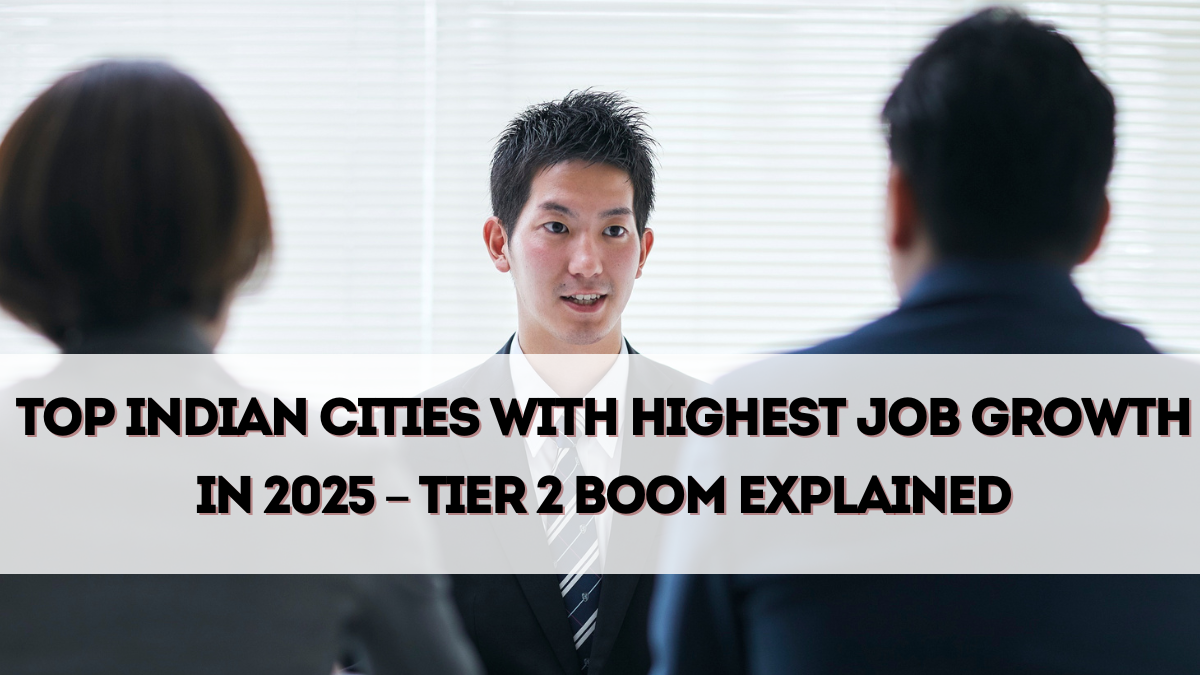The Indian job market in 2025 is undergoing a major transformation, shifting away from traditional metro dominance and toward Tier 2 cities. For decades, cities like Delhi, Mumbai, and Bengaluru were considered the primary job hubs. But today, job growth cities in India 2025 reveal a new trend: smaller cities are attracting massive investments, creating thousands of jobs, and offering professionals a better work-life balance. This Tier 2 boom is one of the most significant employment shifts in recent years.

Why Tier 2 Cities Are Driving Job Growth
Several factors are fueling this growth:
-
Rising infrastructure development: Affordable housing, modern transport systems, and IT parks are being built in Tier 2 cities.
-
Remote and hybrid work adoption: Companies now realize that employees don’t have to be based in metros to deliver results.
-
Government incentives: State governments are offering tax breaks and subsidies for businesses to set up in smaller cities.
-
Lower cost of living: Professionals are moving to Tier 2 cities where expenses are lower while salaries remain competitive.
-
Digital penetration: Internet access and digital services have opened opportunities for businesses across smaller towns.
Together, these factors are making Tier 2 cities the new engines of India’s employment growth.
Top Job Growth Cities in India 2025
Based on hiring data, industry reports, and state government initiatives, these are the top cities driving job growth this year:
-
Pune, Maharashtra: Once known as an educational hub, Pune has become a thriving IT and startup ecosystem, rivaling Bengaluru.
-
Indore, Madhya Pradesh: Emerging as a business-friendly city with strong growth in IT, e-commerce, and logistics.
-
Jaipur, Rajasthan: Expanding in IT services, digital marketing, and tourism-driven industries.
-
Kochi, Kerala: Gaining traction in IT, shipping, and healthcare, fueled by Smart City projects.
-
Lucknow, Uttar Pradesh: Becoming a hub for BPO, IT-enabled services, and manufacturing.
-
Ahmedabad, Gujarat: Strengthening in textiles, pharmaceuticals, and engineering industries.
-
Chandigarh & Mohali: IT startups and education sectors are booming, attracting young professionals.
-
Coimbatore, Tamil Nadu: A growing hub for startups, manufacturing, and software services.
-
Bhubaneswar, Odisha: Emerging as a smart city with focus on IT, education, and infrastructure.
-
Nagpur, Maharashtra: Expanding logistics, education, and metro infrastructure are creating opportunities.
These cities are no longer secondary choices—they are becoming prime destinations for job seekers and businesses.
Industries Thriving in Tier 2 Cities
The job growth cities in India 2025 are supported by rapid expansion in key industries:
-
Information Technology (IT): Tier 2 cities are becoming attractive for IT companies due to cheaper office space and skilled local talent.
-
Startups & E-Commerce: Small businesses and digital startups are thriving thanks to lower operational costs.
-
Manufacturing & Engineering: Cities like Ahmedabad and Coimbatore are growing in textiles, automobiles, and machinery.
-
Healthcare & Education: Rising demand for hospitals and universities in smaller cities creates thousands of jobs.
-
Tourism & Hospitality: Cities like Jaipur and Kochi are benefiting from growing domestic and international tourism.
These industries are not only creating jobs but also boosting regional economies.
Benefits of Working in Tier 2 Cities
Professionals choosing to work in Tier 2 cities enjoy several advantages:
-
Lower living costs: Housing, transport, and daily expenses are significantly cheaper.
-
Better work-life balance: Less traffic, cleaner air, and shorter commutes improve lifestyle quality.
-
Growing salaries: With rising competition for talent, salaries in Tier 2 cities are becoming comparable to metro levels.
-
Emerging opportunities: Professionals can take leadership roles faster in smaller markets.
-
Community-driven culture: A closer connection with local communities provides a more fulfilling lifestyle.
These factors are attracting young graduates and experienced professionals to explore opportunities outside metros.
Government Role in Boosting Tier 2 Job Growth
Government policies are actively encouraging companies to move beyond metros:
-
IT Parks & SEZs: States are setting up new IT hubs in Indore, Lucknow, and Jaipur.
-
Skill Development Programs: Initiatives under Skill India and state schemes are training local talent.
-
Startup Incentives: States like Gujarat, Tamil Nadu, and Rajasthan are offering tax rebates and funding support to new businesses.
-
Infrastructure Investment: Projects like smart cities, metro expansion, and expressways make Tier 2 cities more accessible.
These initiatives are bridging the gap between Tier 1 and Tier 2 employment ecosystems.
Challenges Faced by Tier 2 Cities
Despite strong growth, there are challenges to address:
-
Limited global exposure compared to metros
-
Skill gaps in advanced technologies
-
Infrastructure still catching up in certain sectors
-
Slower career networking opportunities compared to Delhi or Bengaluru
However, with increasing corporate investments, these challenges are gradually being resolved.
Future of Job Growth in Tier 2 Cities
The Tier 2 boom is expected to continue well beyond 2025. By 2030, India may witness a more balanced distribution of jobs between metros and smaller cities. With rising digital adoption, better infrastructure, and government focus, Tier 2 cities will become the backbone of India’s employment market.
FAQs
Which Indian city has the highest job growth in 2025?
Pune, Indore, and Jaipur are among the fastest-growing cities offering strong job opportunities this year.
Why are Tier 2 cities better for job seekers in 2025?
They offer lower living costs, less congestion, and competitive salaries while still providing career growth.
What industries are expanding in Tier 2 cities?
Information technology, manufacturing, healthcare, education, and tourism are driving job growth.
Are Tier 2 cities good for freshers?
Yes, freshers often find faster growth opportunities in Tier 2 cities where competition is lower and demand is rising.
Will Tier 2 cities replace metros as job hubs?
Not completely, but they will complement metros by creating balanced employment across India.
Click here to know more.
